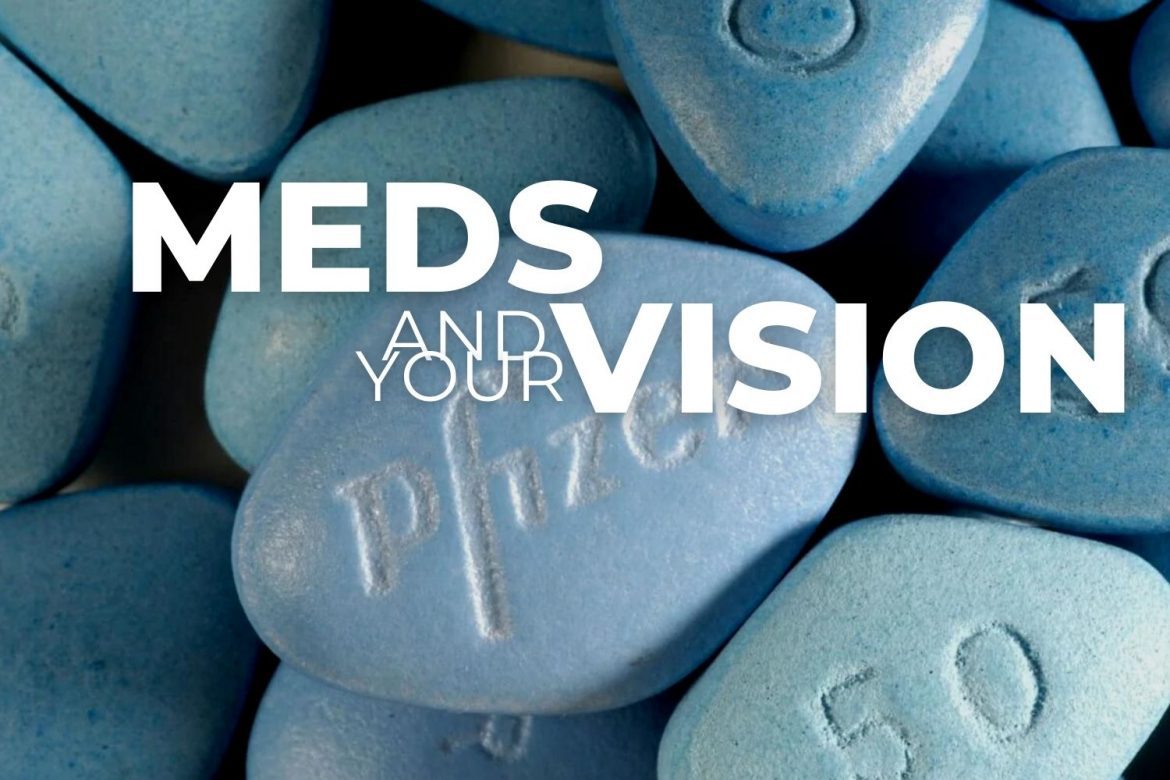309 total views , 1 views today
Your daily medication can be life-saving, or at the very least, life-changing. It specifically targets the condition you have to maintain your health and wellbeing.
Unfortunately, systemic medication often triggers annoying complications, including affecting your vision.
Ocular side effects
Are your eyes watering, itchy or blurry? Have you blamed seasonal allergies or contact lens intolerance? It’s possible your daily medications are responsible for your symptoms.
Your eyes are small and have a rich blood supply. Your medications travel through the systemic system and feed into the rich blood vessel network in the eye: the choroidal and retinal circulation.
Some ocular side effects, like dry eye, are minor but others can be vision-threatening. Your eye doctor will often ask you in detail about your medications. Some drugs stand out as ‘heavy-hitters’ when it comes to causing ocular symptoms.
Dry eye and inflammation
With every blink, you spread a tear layer across the surface of your eye. Adequate lubrication ensures optical clarity. Some medications reduce the volume of tears your eye produces leaving you with a dry eye. You will experience burning, irritation, and ocular fatigue.
Antihypertensives, diuretics, antidepressants, and antipsychotics can cause significant dry eye.
Isotretinoin is a medication used to treat acne. Ocular side effects from this medication include dry eye, inflammation of the eye and eyelid, decreased tolerance for contact lens wear, and light sensitivity.
Fosamax and Risedronate are usually prescribed for post-menopausal women to prevent weakening of the bones. These medications can cause inflammatory reactions in the eye including conjunctivitis, uveitis, scleritis, episcleritis, and keratitis.
Cataract formation
Corticosteroids are frequently used to treat asthma, skin conditions, allergies, and arthritis. Whether you are using these in pill, nasal spray, or cream form they can cause swelling in the retina at the back of your eye, elevate intraocular pressure and lead to cataract formation.
Chronic exposure to nasal steroids used to treat allergies, or steroid creams used to manage skin conditions can increase your risk of cataract formation.
Glaucoma
When there is increased pressure inside your eye, or the main nerve—the optic nerve—is damaged at the back of your eye you may be developing glaucoma. You will slowly lose your peripheral vision if glaucoma is left untreated.
Certain medications can trigger glaucoma. Topiramate is a medication prescribed to treat epilepsy and migraine headaches. But it can cause acute glaucoma in some patients. Signs include increased eye pressure, dilated pupil, and blurred vision. Some patients can also become short-sighted when using this drug.
Corticosteroids can trigger or exacerbate glaucoma in susceptible people.
Optic nerve inflammation (Neuritis)
Sildenafil (Viagra) is used to treat erectile dysfunction. Ocular symptoms include altered color perception, blurred vision, eye pain, and light sensitivity. The side effects are rare, more common at higher doses, and in most cases resolve once you stop the medication.
A sudden and permanent loss of vision can occur when taking Sildenafil if the blood flow to the optic nerve is interrupted. This rare condition is called ischemic optic neuropathy.
Ethambutol is prescribed in the treatment of tuberculosis. Ocular side effects include color vision changes and peripheral vision issues, and rarely sight-threatening optic neuritis.
Retinal toxicity
Hydroxychloroquine is commonly used to treat malaria, lupus, rheumatoid arthritis, and other autoimmune disorders. It can be toxic to your retina and cause deposits in the cornea, the clear window at the front of your eye.
Antipsychotic medications can also cause retinal toxicity and affect your vision.
Tamoxifen is commonly used in the treatment of breast and ovarian cancer and can cause retinal toxicity affecting your central vision.
Corneal opacities
Amiodarone is a medication used to control heart rhythm in people with atrial fibrillation. Side effects are dose-dependent. The most common ocular side effect is corneal opacities.
Non-steroidal anti-inflammatory medication such as Indomethacin can cause corneal opacities giving rise to light sensitivity. They can also affect your color vision and in rare cases cause toxic optic neuropathy.
Floppy iris syndrome
The iris, the colored part of your eye, is usually rigid. With some medications, the muscle tone in the iris can be affected and make it floppy. Tamsulosin, which is used to treat symptoms related to an enlarged prostate, has been associated with intraoperative floppy iris syndrome (IFIS).
IFIS can cause complications at the time of cataract surgery. You should always advise your ophthalmologist if you are taking this medication.
Play it safe
When you’re prescribed a new medication, you need to be aware of any potential side effects.
Always read the warning labels. If you have other risk factors like pre-existing glaucoma or cataracts then the medication may be contraindicated. When you have been using medication at a high dose or for a long time, your risk of ocular complications increases.
Treating the symptoms caused by systemic medications becomes a team effort. Your physician and eye doctor will collaborate and may prescribe alternate medications with fewer ocular side effects.
Sometimes, regardless of side effects, the benefits of systemic medications still outweigh the risks. Always discuss with your doctor the safest option for you to devise a successful treatment plan.


